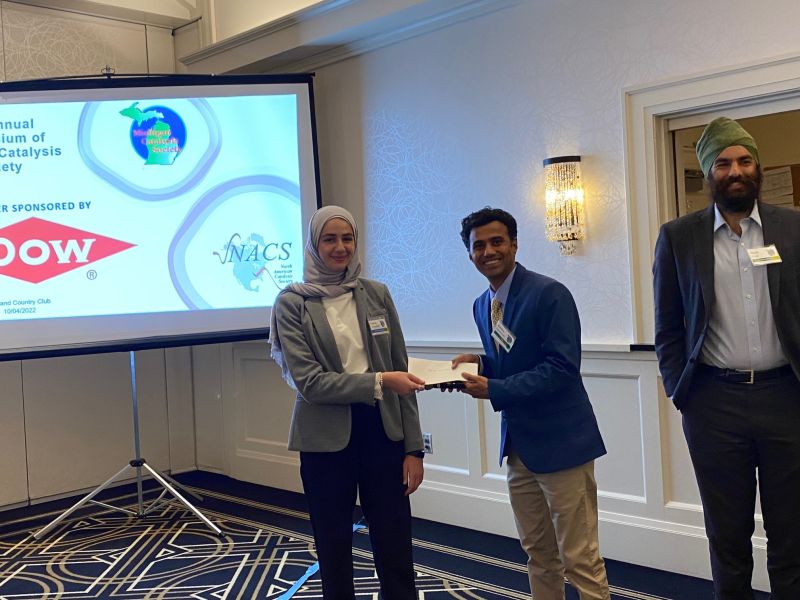
Two Chemical Engineering PhD students honored by Michigan Catalysis Society
Rawan Almallahi and Cameron Gruich received outstanding student presentation awards at the Michigan Catalysis Society Symposium.

Rawan Almallahi and Cameron Gruich received outstanding student presentation awards at the Michigan Catalysis Society Symposium.
Two Chemical Engineering PhD students were honored with outstanding presentation awards at the 43rd Annual Michigan Catalysis Society Symposium hosted in Midland, Michigan on October 4, 2022.
Rawan Almallahi received the outstanding student presentation award for her work in the Linic Lab centered on addressing sustainability challenges associated with the emergence of inexpensive and abundant natural gas in the chemical industry.
Her work focuses on utilizing innovative approaches to develop more efficient systems and processes to seamlessly upgrade natural gas components into higher-value chemicals. Almallahi shared her work on developing superior catalyst membrane materials, and coupling them into one reactor system for an essential industrial reaction: propane dehydrogenation, which is one of the most promising technologies for direct production of propylene.
“Propylene is one of the most diverse building blocks in the petrochemical industry,” Almallahi explained. “Propane is a component of shale gas, which is currently mainly flared leading to negative environmental effects.”
These coupled membrane catalyst systems hold great potential for the chemical industry in relation to their anticipated high propane conversions, process simplification and lower downstream separation costs.
Almallahi and collaborators previously reported the design of a stable and selective catalyst for propane dehydrogenation operating at the thermodynamic limit. Using reaction engineering, this superior catalyst performance is pushed beyond equilibrium limits, based on Le Châtelier’s principle. Their work demonstrates that by coupling the selective propane dehydrogenation catalyst to a hydrogen-removing hollow fiber membrane, they can co-design a catalyst membrane system that will operate at lower temperatures and with propane conversions that exceed thermodynamic equilibrium limitations. These findings set the stage for optimal catalyst membrane design approaches and may have a sizable impact on the chemical industry.
“I am honored to receive this award, and am really glad my research presentation was well received.”
Rawan Almallahi
“I am honored to receive this award, and am really glad my research presentation was well received,” Almallahi said.
Cameron Gruich received the outstanding student poster award for his work in the Goldsmith Lab investigating how to make the state-of-the-art neural network machine learning models trustworthy by applying uncertainty quantification.
“Like when a weather forecast says there is an 80% chance of rain, uncertainty quantification allows us to determine the chance that a material behaves like a model says that it should,” Gruich explained.
His research investigates reliably drawing confidence intervals around materials property predictions made by machine learning models, which would enable a practical route for researchers to trust in high-throughput materials discovery.
Ultimately, the work aims to develop tools that will accelerate the discovery of new materials across applications and bridge the gap between experimental and computational collaborators by making machine learning models more trustworthy for high-throughput experiments.
“I am very thankful for the recognition of my research poster and gratefully acknowledge the support and guidance of my advisor. Experimental researchers seemed receptive to my effort in trying to communicate and solve these problems, which I take as a great sign.”
Cameron Gruich
“I am very thankful for the recognition of my research poster and gratefully acknowledge the support and guidance of my advisor,” Gruich said. “Experimental researchers seemed receptive to my effort in trying to communicate and solve these problems, which I take as a great sign.”
Almallahi and Gruich join a list of Michigan Catalysis Society award winners including many University of Michigan students, alumni and faculty.